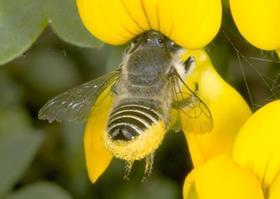
Neonicotinoid pesticides can damage both domesticated honey bees and wild bees, a major European-wide study has found.
The £2.8 million two-year long study was commissioned by agro chemical giants Bayer CropScience and Syngenta and carried out by Centre for Ecology & Hydrology (CEH) in the UK.
Researchers treated oilseed rape seeds with neonic pesticides clothianidin and thiamethoxam in 33 sites in the UK, Germany and Hungary.
Results found that in Hungary and the UK, on average 24 per cent fewer worker honey bees returned the following spring to crops that were treated with clothianidin. In Germany, there were no lasting effects in honey bee colonies near the treated crops.
Richard Pywell, an ecologist at CEH, said the German honey bees may have fared better because the colonies were generally healthier than in the other two countries. Wildflowers growing near the German fields might also have made the bees more resilient, he said.
'What this study might be telling us is that the bigger impact on the pollinators is not the pesticides but the larger landscape,' said Peter Campbell, head of product safety research collaborations at Syngenta.
But Soil Association policy officer Louise Payton said: “This long-awaited major study was funded chiefly by industry to end this debate. This should now be the final, fatal blow to neonicotinoids. With neonics widely polluting farms, and with UK farmers still treating most wheat, an outright ban is needed immediately.
“A good next step would be to learn from organic farms, which support around 50 per cent more species of wild pollinators than non-organic farms.”
CEH researchers also found that signs of harm correlated with higher levels of chemicals in nests. And they found that nests contained low levels of imidacloprid, a neonicotinoid that has been banned in Europe since 2013, suggesting neonics persist in the environment and are taken up by wildflowers, exposing bees years later.
Published in the Science Journal, the CEH study has been touted by some as ending the debate on neonics, but environmental campaigners and agro chemical companies have again issued contrasting responses. Matthew Shardlow of the conservation group Buglife said the findings help justify the current EU moratorium, while ecologist Jeremy Kerr, of the University of Ottawa, said: 'The risks of neonicotinoids have been understated in the past and the benefits have been overstated.”
Christian Maus, lead scientist for bee care at Bayer CropScience said: 'We continue to be convinced that the products are safe for bees.'



